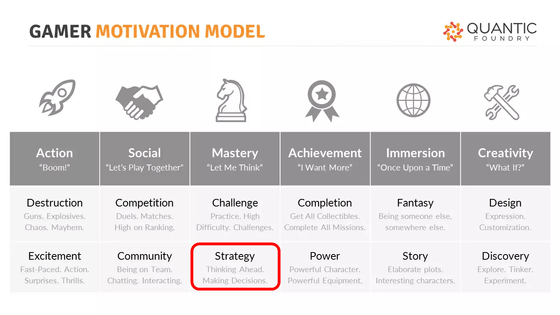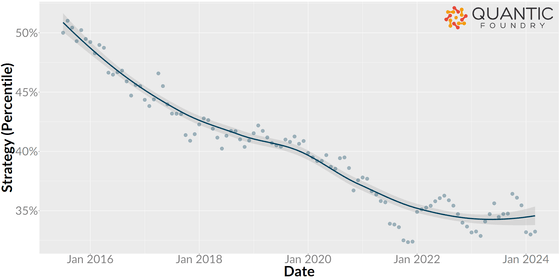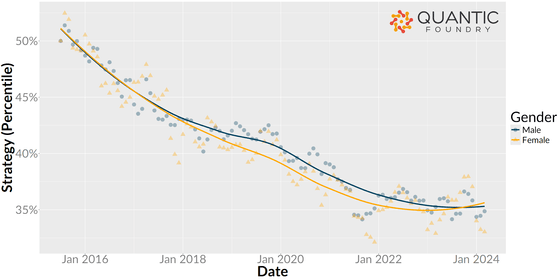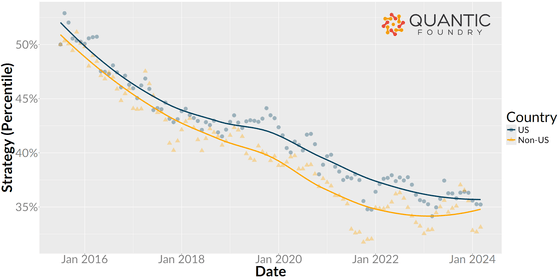Survey reveals that gamers are becoming less interested in 'strategy' games

If you're a gamer who says, 'I haven't been playing many games that require careful thinking lately,' you may not be the only one whose gaming preferences have changed. A survey of more than 1.5 million gamers over a 10-year period revealed that gamers' preferences for games that require a lot of strategy and planning have changed significantly.
Gamers Have Become Less Interested in Strategic Thinking and Planning - Quantic Foundry
Quantic Foundry, a market research company specializing in research on gamer motivation, published an article on May 21, 2024, analyzing data from the 'Gamer Motivation Profile,' a survey the company has been conducting since 2015.
The data includes data from 1.57 million gamers who participated in the survey between June 2015 and April 2024. Of the gamers in the sample, 75% identified as male, 21% as female, and the remaining 4% identified as non-binary .

By platform, 81% of gamers play games regularly on PC, 55% on home consoles, and 34% on mobile devices. However, mobile gamers, especially casual gamers, are less likely to self-identify as gamers, so they tend to be underrepresented in the analysis.
In addition, 46% of the respondents were from North America and 26% from Western Europe, with the majority being gamers from Europe and the US. However, because China's game industry has undergone unique development, and gamer trends there are significantly different from those of other regions, responses from China were excluded from the analysis.
Using this data, we analyzed how gamers' preferences have changed over the past nine years and found that of the 12 main categories of game elements, strategy has changed the most.

Below is a graph showing how strategic games have changed over time, assuming a score of 50% at the start of the survey. Between June 2015 and April 2024, the score for the attractiveness of strategy elements in games dropped from 50% to the 33% range. 'Simply put, 67% of gamers in 2024 value strategy and planning less than the average gamer in 2015,' Quantic Foundry explains.

The results of the analysis are divided into male gamers (blue) and female gamers (orange) below. The tendency to dislike strategy elements was almost the same for both men and women, with no significant gender differences.

Similarly, there were no significant differences between American gamers (blue) and gamers from other regions (orange).

When thinking about major changes that have occurred during the survey period, the COVID-19 pandemic immediately comes to mind, but Quantic Foundry's analysis shows that the trend away from strategy elements began before June 2015, and is a very gradual, long-term change.
From this, Quantic Foundry concluded that 'whatever the cause, the decline of strategy elements is not a passing moment, but is likely part of a larger, longer-term cultural and psychological shift.'
However, looking at the graph, it can be seen that 'the downward trend subsided around January 2020 when the threat of COVID-19 became serious, then picked up momentum again during the pandemic, and then slowed down again after the COVID-19 quarantine policy was lifted.' It is pointed out that the hypothesis that the trend that had been continuing for a long time has worsened due to COVID-19 is also valid.

Another hypothesis is that social media often reduces attention span, but reports of reduced attention spans are not limited to games, such as the time spent watching YouTube, the length of a single shot in a movie, or the time PC users use a single window. There is also no evidence to prove a causal relationship between social media use and reduced attention span.
From this point of view, Quantic Foundry said, 'While the root cause is unclear, it is true that gamers have become less interested in strategic thinking over the past nine years. In other words, gamers are increasingly avoiding complex games. This will also affect game developers' future game design and marketing.'
Related Posts:
in Game, Posted by log1l_ks







